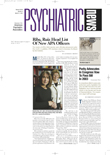I would like to comment on the study reported in the February 7 issue in the article “Prescription Data on Youth Raise Important Questions.” The graphs that accompanied the article showed a marked increase in the usage of all types of psychotropic medications.
Many issues were raised in the article, but I did not see a discussion of the fact that for many years the child psychiatry community was dominated by analytically oriented psychiatrists even more so than the adult group. These psychiatrists promoted the idea that children should not be given psychotropic drugs, and some suggested that the use of them would perhaps be developmentally harmful.
Many of us adult psychiatrists who saw an occasional child or adolescent did not follow this guideline and found that children and adolescents tolerated the medications well and benefited from them.
I recall a 14-year-old girl whom I saw about 20 years ago. She had been diagnosed with school phobia after being unable to attend school for three consecutive years and was treated with family therapy. Unbeknown to the psychiatrist treating her, her family physician had put her on an antidepressant each year, and each time after about two months she returned to school, with the psychiatrist thinking it was the result of the family therapy. Unfortunately, the medication was stopped when she returned to school. When I saw her during the fourth year, I discovered that her family had a prominent history of bipolar disease, and some family members had responded to lithium. I put her on lithium, and she was back in school in three weeks with no other form of therapy. She was kept on lithium, and her symptoms never returned; she is now a mother and schoolteacher.
What is now happening is a long-overdue catching up in prescribing psychotropics to children and adolescents. There is a greater recognition that children have the same organically and genetically caused diseases that adults have and require similar treatment.
Some may find it shocking to learn that I encountered a patient who was treated back in the 1940s at the age of 10 for a schizophrenic episode with deep coma insulin and electroconvulsive therapies by a psychiatrist a generation older than I. I saw her as a 30-year-old after she had relapsed into another clearly paranoid schizophrenic episode but was responsive enough to be controlled with antipsychotic drugs. However, the somatic therapy she had had at 10 kept her well enough for 20 years for her to complete college, marry, and have a child. Of course, there are some poorly trained physicians who may inappropriately use these drugs, but it happens with adults as well as children.
